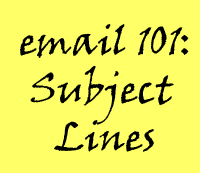 Okay, I’ve just got to let off some steam. I’ve been using computers for years. I’ve built them. I’ve coded the programs that run on them. I’ve been technical support. I’ve even taught classes on how to use them and how to use software on them. But it fries my cookies how many people who send email daily can’t seem to grasp the importance of having a good clear subject line.
Okay, I’ve just got to let off some steam. I’ve been using computers for years. I’ve built them. I’ve coded the programs that run on them. I’ve been technical support. I’ve even taught classes on how to use them and how to use software on them. But it fries my cookies how many people who send email daily can’t seem to grasp the importance of having a good clear subject line.
Today, I got a document I was expecting, from someone working on a project with me. The subject line was so off the wall that I had clicked to move it to my junk folder before I noticed the email address of the sender and managed to pull it back and read it. The attachment was the document I was looking for. A bit less caffeine or attention and it would have hit the junk folder and I’d have deleted it forever. Until now I thought the problems I was having getting information from this person was because my ISP was blocking them or it was getting caught in my firewall. Who knew that this person couldn’t write a subject line along the lines of: Here’s the document on X. Granted I get spam like that but it would have been better than the line that was used.
We have a friend who either doesn’t enter a subject line at all or who says “hello”. Doesn’t this friend realize (even after being told) that I get about 40 similar emails every day from spammers and those my spam filter usually picks up automatically and puts them in the Junk folder. (Yes, I do check my Junk folder for email address of the usual suspects.)
I moderate a list that is supposed to have only two types of emails posted. To stay on the list they must participate and a program checks the posts against membership and the various subject lines, because anything that does not start with one of the allowable subject lines, doesn’t count for participation. Guess what? Bet you can — many people can’t seem to do it. When I know they’re new to email and the internet, that’s one thing. But those who have been reminded repeatedly still mess up regularly. I won’t even go near the send-the-email-to-the-right-list rant.
What’s the big deal? I mean when you use snail mail you have to put on the receiver’s mailing address. You can’t just say, Sam Somebody, a street with a tree, East Coast. No, you have to be explicit about where you want your mail to go. It’s the same with email. You have to put the correct email address in the TO field. But if you want the person to actually look at it, the email should let them know, sort of, what the email is about. Our dinner plans for Friday. The proofs for the story. The document on X that you asked me for. Something to trigger the “I should read that circuit”.
When I get spam, and I get a lot, I scan for subject lines that might be valid and then check the address of the sender. If the address is valid, I’ll take a peek at the email (it’s already been scrubbed for viruses and such). If the subject lines is a non-starter, I may not even look at the sender.
I’m sure I’m not the only one fed up with the poor use such an important communications tool — the Subject Line. I’m just not sure why people don’t use it correctly to impart information. How can anyone get them to change? Maybe it’s just me. To some degree, I know it is because I’ve got a lot of tasks piled up and I’m still recovering from being ill so I’m low on energy. But, I had to vent.
And, yes. I’m actually interested in knowing if I’m the only person that gets bent out of shape about this topic. Let’s face it, I can’t cure the world’s ills until I manage to become Supreme Mugwump. So, I’ve decided to worry about the little things that just might be fixable. If not fixable, at least I can get it out of my system and move on to more important things, like the fact that no matter how many spoons I buy, there are never enough.
From 1989 to 1992 WSFA Press published one book each year to honor the Guest of Honor of its annual convention, Disclave, and now for Capclave 2009, WSFA Press lives again, returning to its roots, with a new website, wsfapress.com, a renewed focus, and a new project: a limited run of Reincarnations by Harry Turtledove, a short story collection containing six stories never-before-reprinted, an original story, story notes, and an introduction by Sheila Williams, the editor of Asimov’s Science Fiction Magazine.

 Okay, I’ve just got to let off some steam. I’ve been using computers for years. I’ve built them. I’ve coded the programs that run on them. I’ve been technical support. I’ve even taught classes on how to use them and how to use software on them. But it fries my cookies how many people who send email daily can’t seem to grasp the importance of having a good clear subject line.
Okay, I’ve just got to let off some steam. I’ve been using computers for years. I’ve built them. I’ve coded the programs that run on them. I’ve been technical support. I’ve even taught classes on how to use them and how to use software on them. But it fries my cookies how many people who send email daily can’t seem to grasp the importance of having a good clear subject line. Today I ran across an article on IT World by Jennifer Kavur called
Today I ran across an article on IT World by Jennifer Kavur called 